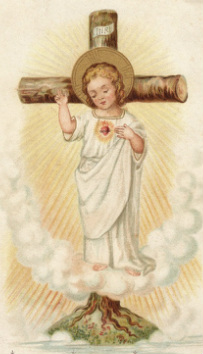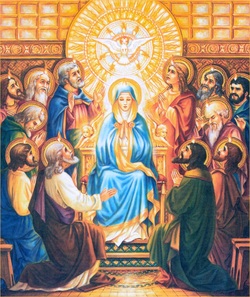
I remember, some years ago, finding myself in a bus with a nurse in charge of a small child. They were Catholics; the nurse was zealous and the small child looked decidedly angry. A discreet struggle was going on; at last a little hand was flung out, a small red badge fell to the ground, and the tiny conqueror said in a loud voice, "I don't want it." There was a low-toned explanation from the nurse, and the answer, not low at all, was, "I don't know what Sacred Heart means."
At once I found myself sympathizing with the child; it is so disagreeable to have to do a thing you do not understand. There are two ways out of the difficulty. You can, of course, refuse to do things, but that most often means some naughtiness getting mixed up with the matter; or you can try to understand, which seems to me much better.
"Do you know what Sacred Heart means?" Would you like to try to understand, for during the month of June, in the week following Corpus Christi, the Church keeps the Feast of the Sacred Heart. Have you ever had to work out a problem in arithmetic dealing with millions of florins and millions of people? Did your governess try to explain it to you ? If so, I am sure she stated it in terms of three and four pennies and a few little boys and girls. She began with something familiar to you, and before you knew what was happening I expect you saw just what that sum meant. Begin with something familiar now. Perhaps some of you have made your first Holy Communion this year, and for a long time before the priest and your mother often talked to you about getting your "heart" ready for our Lord. You understood quite well what they meant, and tried to make it very full of love—a golden throne from which the little King could rule the empire of your soul.
You have, I am sure, some special friend, and you speak to her or him as having "the kindest heart" in the world. That is plain. Suppose you were at school a long way from home and about the middle of term someone told you quite suddenly, "Your mother has come to see you." I can imagine your saying afterwards, "My heart jumped with joy." If you are a girl and a naughty little brother jumps from behind a door as you are going upstairs in the dark, would not your " heart almost stop with fear." If a friend has not acted quite fairly to you, or you are dreading some pain, you know that "your heart feels heavy"; indeed, if God has already allowed some great trouble to come to you, did you not think at the time that your "heart would break "? There is no difficulty at all in understanding this. It is quite simple; we are accustomed to speak in this manner, because in our minds that "heart" stands for all these ideas and emotions, and we always think of it as united to some person. By this time, I am sure, some of you are saying: "Oh yes ! I begin to see what that means."
Our dear Lord is such a great subject for our little minds that we often, as it were, get hold of just one side of Him. We begin to think that He is the great God, the Second Person of the Blessed Trinity, and in the process forget entirely that He became man.
Now, devotion to the Sacred Heart corrects this, and makes us remember that He had a human heart capable of all our emotions. It could beat quicker when He thought of His Mother; it could almost stop with fear; could be crushed by unkindness,and expand with gratitude just like yours and mine.
If we begin at the other end, and, in thinking that Jesus Christ is truly man, are in danger of forgetting His Divinity, the devotion to the Sacred Heart pulls us up with a kind of spiritual jerk, by the demand for our adoration. Of course, when we pray to the Sacred Heart all our devotion is offered to our Blessed Lord Himself, Who has taken our human nature and united it to His own Divine Person in such a wonderful way that we adore the Sacred Body as the Body of the Son of God.
Why do you genuflect each time you pass before the Blessed Sacrament ? Is it not because it is the Body of Christ ? Each part of that Body is adorable because united to the Divinity—the dear Hands that caressed the little children, and are raised over us so often in blessing and absolution; the Feet so wearied in seeking for sinners; the Face so insulted and dishonoured during the Passion: but in a special manner the Church draws our attention to the pierced Heart, for the very reasons of which we spoke above, and which makes us single out the heart to stand for so much in life. The statue of the Sacred Heart which I like best is in the church at Haverstock Hill, London.
At the end of the long altar rail is a white statue of our Blessed Lord, one hand rests upon His Heart, but the other points to the Tabernacle to remind us that there behind the tiny door is that loving Heart, not cut in stone or painted on canvas, but really living for us, waiting for our visit and longing to find a home in our heart.
Do you know who first spoke of devotion to the Sacred Heart ? If you were with me I quite expect I should hear many voices say, ''Blessed Margaret Mary," and perhaps a few, "St. Gertrude;" but I want you to look in your New Testament, St. Matthew, chapter eleven, verse twenty-nine, and you will find our dear Lord Himself saying these words: "Learn of Me, for I am meek and humble of Heart." That is the real test of true devotion, you know. Do you learn the lessons it is meant to teach ? The Church, thinking of that text, has given us the beautiful invocation, "Jesus, meek and humble of Heart, make my heart like unto Thine."
Source: A Wreath of Feasts for the Little Ones, Imprimatur 1912
Below are some coloring pictures of the Sacred Heart of Jesus.
|
| ||||||||



 RSS Feed
RSS Feed